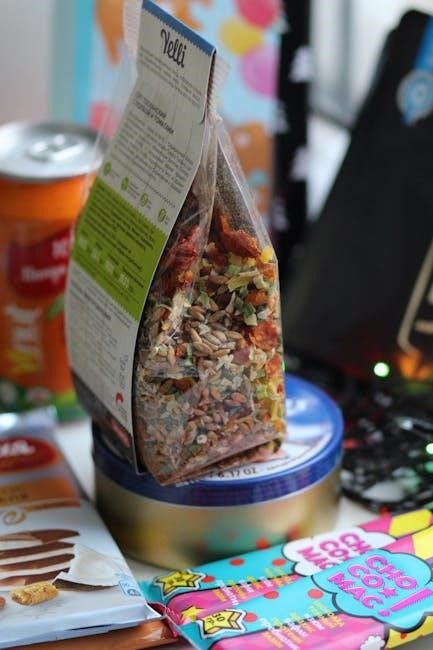
Minsk’s nutrition scene reflects its rich cultural heritage‚ emphasizing traditional ingredients like rye bread‚ potatoes‚ and dairy‚ influenced by historical and festive culinary practices․
Overview of Minsk’s Approach to Nutrition
Minsk’s approach to nutrition combines traditional and modern practices‚ emphasizing locally sourced ingredients like rye‚ potatoes‚ and dairy․ The city promotes balanced diets‚ blending hearty‚ wholesome meals with contemporary health trends․ Sustainability is a growing focus‚ with initiatives encouraging mindful eating and food security․ This holistic approach reflects Minsk’s commitment to nurturing both cultural culinary traditions and innovative nutrition strategies․
Importance of Nutrition in Minsk’s Culture
Nutrition plays a vital role in Minsk’s cultural identity‚ reflecting the city’s heritage and values․ Mealtimes are often seen as opportunities for family and community bonding‚ with traditional dishes like draniki and machanka embodying cultural pride․ Festivals and celebrations frequently center around food‚ showcasing local ingredients and preserving culinary traditions․ This deep connection highlights nutrition’s role in maintaining cultural continuity and national identity in Minsk․

Historical Influence on Nutrition in Minsk
Minsk’s nutrition has been shaped by its historical journey‚ adapting traditional ingredients like rye and potatoes‚ influenced by cultural exchanges and historical events over centuries․
Traditional Dietary Habits
Minsk’s traditional diet emphasizes hearty‚ locally-sourced ingredients like potatoes‚ rye bread‚ and dairy․ Historical influences‚ such as its Soviet past‚ shaped dishes like blini and borscht․ Preservation methods‚ including pickling and fermenting‚ are common․ Festivals feature authentic Belarusian cuisine‚ showcasing communal cooking traditions that highlight the city’s cultural identity and resilience‚ blending simplicity with rich flavors rooted in its agricultural heritage and historical legacy․
Impact of Historical Events on Nutrition
Historical events have profoundly shaped Minsk’s nutrition landscape․ Soviet influence introduced communal dining halls and standardized meals‚ while post-Soviet shifts brought Western dietary trends․ Economic factors and accessibility issues still influence food choices‚ blending traditional and modern culinary practices in a unique way․
Cultural Impact on Nutrition in Minsk
Minsk’s nutrition is deeply influenced by Belarusian culture‚ with traditional dishes like machanka and draniki shaping eating habits․ Festivals and celebrations further emphasize local culinary heritage․
Role of Belarusian Culture in Shaping Nutrition
Belarusian culture significantly influences Minsk’s nutrition‚ with traditional dishes like draniki and machanka highlighting local ingredients such as rye‚ potatoes‚ and dairy․ Festivals celebrate these culinary staples‚ reinforcing their importance in daily meals․ Family gatherings and recipes passed through generations further embed these foods into the city’s nutritional identity‚ reflecting a deep connection to heritage and cultural traditions․
Festivals and Celebrations Influencing Nutrition
Minsk’s vibrant festivals‚ such as the annual Minsk City Day‚ showcase traditional Belarusian cuisine‚ promoting dishes like draniki and machanka․ These events highlight local ingredients and culinary techniques‚ inspiring residents to embrace heritage foods․ Festive celebrations often feature communal meals‚ fostering a sense of community and reinforcing the importance of traditional nutrition in the city’s cultural identity․

Key Nutritional Staples in Minsk
Minsk’s culinary staples include hearty meat dishes‚ root vegetables‚ and whole grains․ Traditional recipes like machanka and babka highlight the city’s emphasis on nourishing‚ locally sourced meals․
Common Ingredients and Dishes
Minsk’s cuisine features hearty dishes like machanka (meat stew)‚ draniki (potato pancakes)‚ and babka (meat or potato pie)․ Local ingredients include rye bread‚ potatoes‚ dairy‚ and forest mushrooms․ Traditional soups like borshch and zurek are staples․ Fermented foods‚ such as sauerkraut and pickles‚ are common․ Baked goods like korzhiki and kulaga highlight the city’s baking traditions․ These dishes reflect Minsk’s rich agricultural heritage and cultural influences․
Local Produce and Seasonal Foods
Minsk’s culinary scene thrives on locally sourced produce‚ with potatoes‚ beets‚ and carrots being staples․ Seasonal fruits like berries‚ apples‚ and currants are widely used in preserves and desserts․ Grains such as rye and wheat are integral‚ while dairy products like milk and cheese are central to daily meals․ Mushrooms‚ wild greens‚ and honey are also prized‚ reflecting the region’s lush forests and fertile fields․

Modern Nutrition Trends in Minsk
Minsk’s nutrition scene is evolving‚ with growing interest in health-conscious eating and organic products․ Plant-based diets and sustainable food practices are gaining popularity among urban residents․
Current Health Food Trends
Minsk is witnessing a rise in health-conscious eating‚ with organic and locally sourced products gaining popularity․ Plant-based diets and gluten-free options are increasingly sought after‚ reflecting global trends․ Urban residents are embracing wellness-focused nutrition‚ supported by government initiatives promoting healthier lifestyles․ Supermarkets and cafes now offer a wider range of nutritious alternatives‚ catering to the growing demand for sustainable and healthy food choices․
Popularity of Vegan and Vegetarian Diets
Vegan and vegetarian diets are gaining traction in Minsk‚ particularly among younger generations․ Influenced by global health trends‚ locals are embracing plant-based options‚ with traditional dishes like beetroot soups and potato pancakes naturally aligning with vegetarian lifestyles․ The city’s culinary scene now features more vegan-friendly cafes‚ reflecting a cultural shift toward sustainable and ethical eating‚ supported by community initiatives and growing awareness of dietary diversity․
Nutrition and Healthcare in Minsk
Minsk’s healthcare system emphasizes nutrition’s role in public health‚ integrating traditional diets into modern health strategies to promote overall well-being and disease prevention effectively․
Healthcare Initiatives Promoting Nutrition
Minsk has implemented various healthcare initiatives to promote nutrition‚ including public campaigns encouraging balanced diets and the inclusion of locally sourced‚ seasonal foods in school meals and hospitals․ These efforts aim to improve public health outcomes by fostering healthier eating habits and raising awareness about the importance of proper nutrition in preventing chronic diseases and enhancing overall well-being․
Government Policies on Nutrition
The Belarusian government actively promotes nutrition through policies supporting local agriculture and food security․ Initiatives include subsidies for farmers‚ regulations on food imports‚ and public health campaigns․ These efforts aim to ensure access to affordable‚ nutritious food while emphasizing traditional ingredients and seasonal produce‚ aligning with Minsk’s cultural and culinary traditions to foster healthier communities and sustainable food systems․
Educational Institutions and Nutrition
Minsk’s educational institutions play a key role in promoting nutrition education‚ with schools and universities integrating dietary awareness into curricula‚ fostering healthy eating habits among students and communities․
Nutrition Education in Schools
Minsk’s schools prioritize nutrition education‚ integrating it into curricula to promote healthy eating habits․ Programs focus on balanced diets‚ local ingredients‚ and their health benefits․
Interactive workshops and garden projects engage students‚ fostering practical skills and community involvement in sustainable nutrition practices․
Role of Universities in Nutrition Research
Universities in Minsk play a pivotal role in advancing nutrition research‚ focusing on local ingredients‚ dietary trends‚ and health outcomes․ They collaborate with healthcare institutions to study the impact of traditional Belarusian cuisine on public health․ Research initiatives also explore sustainable agriculture and its contribution to nutritious food systems‚ fostering innovation in the field of nutrition science․
Challenges in Nutrition in Minsk
Economic challenges in Minsk impact nutrition‚ limiting access to affordable‚ diverse food options‚ affecting dietary diversity and health outcomes for many residents․
Nutrition-Related Health Issues
Nutrition-related health issues in Minsk include rising obesity rates and diet-related chronic diseases‚ partly due to high consumption of processed foods and limited access to diverse‚ fresh produce options․
Accessibility and Affordability of Nutritious Food
Minsk faces challenges in ensuring equitable access to nutritious food‚ particularly for low-income populations․ Economic constraints and limited availability of fresh produce in certain areas contribute to dietary disparities․ Affordability remains a significant barrier‚ with healthier options often costing more than processed alternatives‚ impacting public health and nutrition quality across the city․

Future of Nutrition in Minsk
Minsk is embracing sustainable practices and innovative food solutions to enhance nutrition‚ focusing on local produce and healthier options for a brighter‚ more accessible future․
Emerging Trends and Innovations
Minsk is witnessing a rise in sustainable agriculture and organic farming‚ with a focus on locally sourced ingredients․ Vertical farming and plant-based diets are gaining popularity‚ supported by innovative food tech solutions․ The city’s transportation links and logistics improvements ensure fresh produce reaches consumers efficiently․ Government initiatives and educational programs further promote healthier eating habits‚ aligning with global nutrition trends while preserving traditional culinary practices․
Sustainability in Nutrition Practices
Minsk is embracing eco-friendly nutrition practices‚ including local food sourcing and waste reduction․ The city’s free economic zone supports sustainable agriculture‚ while improved transport logistics ensure fresh produce availability․ Government initiatives promote organic farming‚ aligning with global environmental goals; Educational campaigns encourage mindful consumption‚ fostering a culture of sustainability that preserves traditional dietary habits while adapting to modern ecological standards․
Minsk’s nutrition landscape blends tradition with modern health trends‚ emphasizing sustainability and community well-being․ Its evolving approach ensures a balanced future‚ preserving cultural heritage while embracing innovation․
Minsk’s nutrition landscape is a blend of traditional and modern practices‚ reflecting its cultural and historical roots․ Staples like rye bread‚ potatoes‚ and dairy remain central‚ while contemporary trends emphasize health-conscious choices․ The city’s culinary scene is shaped by seasonal produce and festive traditions‚ ensuring a balanced approach to nutrition․ This harmonious mix underscores Minsk’s commitment to sustainable and culturally rich food practices for future generations․
Final Thoughts on the Future of Nutrition
Minsk’s future nutrition landscape is poised for innovation‚ blending tradition with modern sustainability․ Expect a rise in plant-based diets and a stronger emphasis on locally sourced‚ seasonal ingredients․ The city’s cultural identity will remain central‚ fostering a healthier‚ more balanced approach to food․ Collaborative efforts between chefs‚ scientists‚ and policymakers will drive this evolution‚ ensuring Minsk’s nutrition scene continues to thrive sustainably․